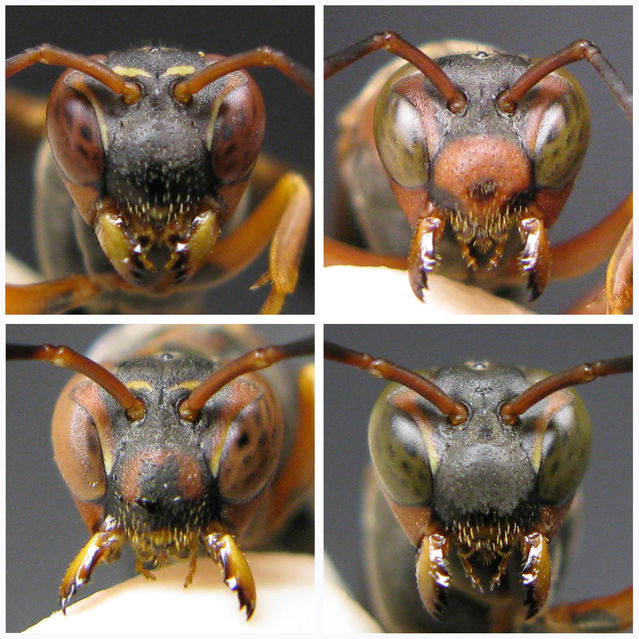Loneliness
Social Isolation Destroys Wasps’ Ability to Learn Faces
Without social experience, wasps cannot learn and recognize individual faces.
Posted May 30, 2019

Recognizing faces is something most of us take for granted; we do it hundreds of times every day. But it’s actually a pretty sophisticated skill. Brain imaging studies in humans have shown that faces are a special type of visual pattern for which we have unique expertise. Our remarkable ability to learn and recognize familiar faces is even supported by a specialized region of the brain, called the fusiform face area.
Considering how important faces are for social interactions, this might not surprise you. But what is surprising is one of the animals with whom we share this ability: paper wasps.
Golden paper wasps (Polistes fuscatus) have unique facial patterns that they use for individual face recognition. Like people, these wasps excel at learning and remembering other individuals.
“It’s definitely unusual in an insect,” says Elizabeth Tibbetts, a biologist at the University of Michigan who discovered the wasps’ facial expertise.
The ability to learn and recognize other wasps’ faces is a key mediator of social interactions in this species. In the spring, multiple queens cooperate to found a nest, but the ‘alpha queen’ is the only one who lays eggs. Beneath her, there is a linear hierarchy of wasps that is determined by aggressive interactions. Individual recognition allows everyone to know their place in the hierarchy and reduces conflict.
“Individual face recognition is important before nest founding, when queens fight with other individuals, and then after they found the nest and live in these complicated social groups,” says Tibbetts.
“Wasps learn what other individuals look like so next time they meet, they don’t need to fight again; they can just say, ‘Oh, that’s Susie, I met her last week and I know how strong she is.’”
Face Time
In a new experiment, Tibbetts and her colleagues tested the effect of social isolation on the development of facial recognition in golden paper wasps. The researchers isolated wasps for 6 days after they emerged as adults from pupation, then tested whether social experience influenced their ability to learn wasp faces in a training task and during social interactions.
In the first task, wasps were trained to discriminate pairs of wasp faces. One was associated with a mild electric shock and the other was associated with safety. Then they were tested in a T-shaped maze where they could walk toward either the side with the “shocking” face or the side with the “safe” face. The idea is that if they can learn to discriminate the faces, they will go to the safe face more often than chance.
In the second task, Tibbetts and colleagues set up the isolated wasps in paired fights. They introduced two wasps and had them fight and then reintroduced them a few days later. If the wasps remembered each other, they were expected to be less aggressive when they met again.
The researchers found a dramatic effect of social isolation: it prevented the development of individual face recognition in these wasps.
“Social isolation made them dumb,” says Tibbetts. “The isolated wasps couldn’t learn individual faces during training and did not remember the wasps they met before in social interactions.
“I was surprised that social isolation completely erased their recognition abilities.”
There is plenty of experimental and observational evidence that social isolation has negative effects on an animal’s ability to interact with others. This study suggests that one of the reasons for this is that isolation interferes with recognition ability. Without recognition, it’s difficult to have effective social interactions.
Tibbetts says it’s hard to compare wasp and human face recognition.
“What we do as humans is incredibly complicated – we learn hundreds of individuals and we know a lot of stuff about them. We don’t really know how many individuals a wasp can recognize. Nests are comprised of about thirty individuals, but they interact with more wasps before nest founding,” she says.
“We’re at the beginning of learning what wasps know about each other and the complexity of their individual face recognition ability.”
References
Tibbetts, E. A., Desjardins, E., Kou, N., and Wellman, L. (2019). Social isolation prevents the development of individual face recognition in paper wasps. Animal Behaviour 152: 71-77. Doi: 10.1016/j.anbehav.2019.04.009.




